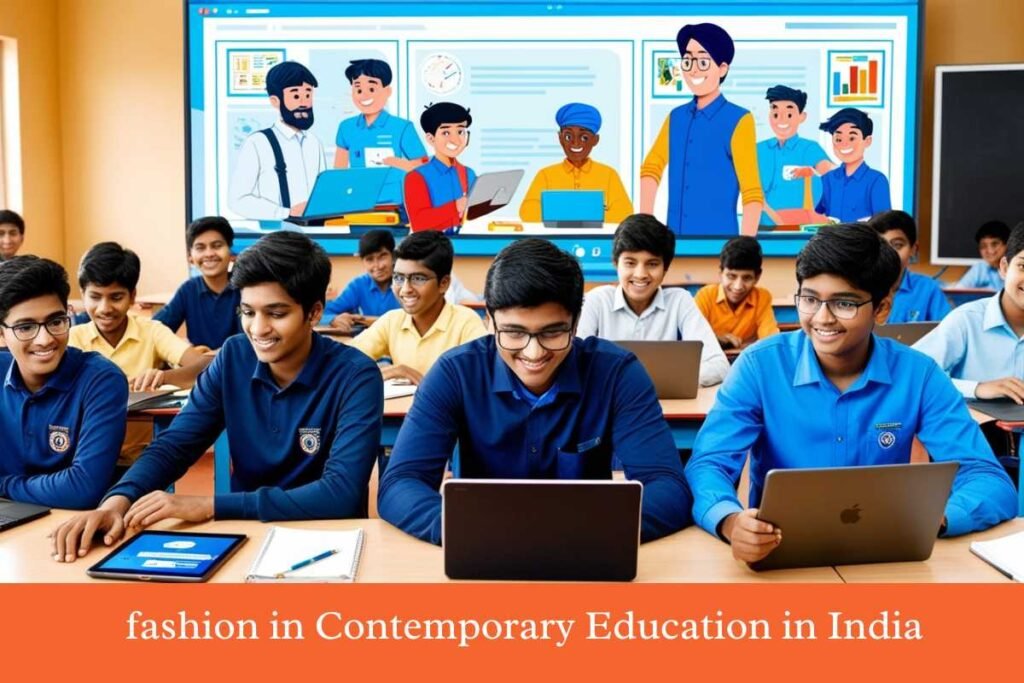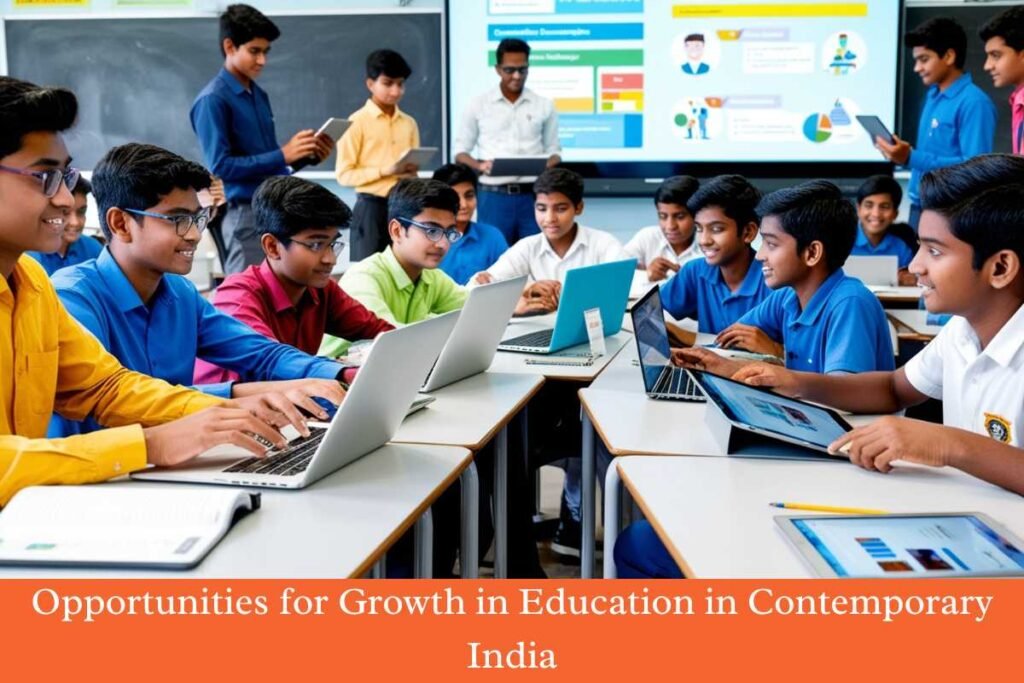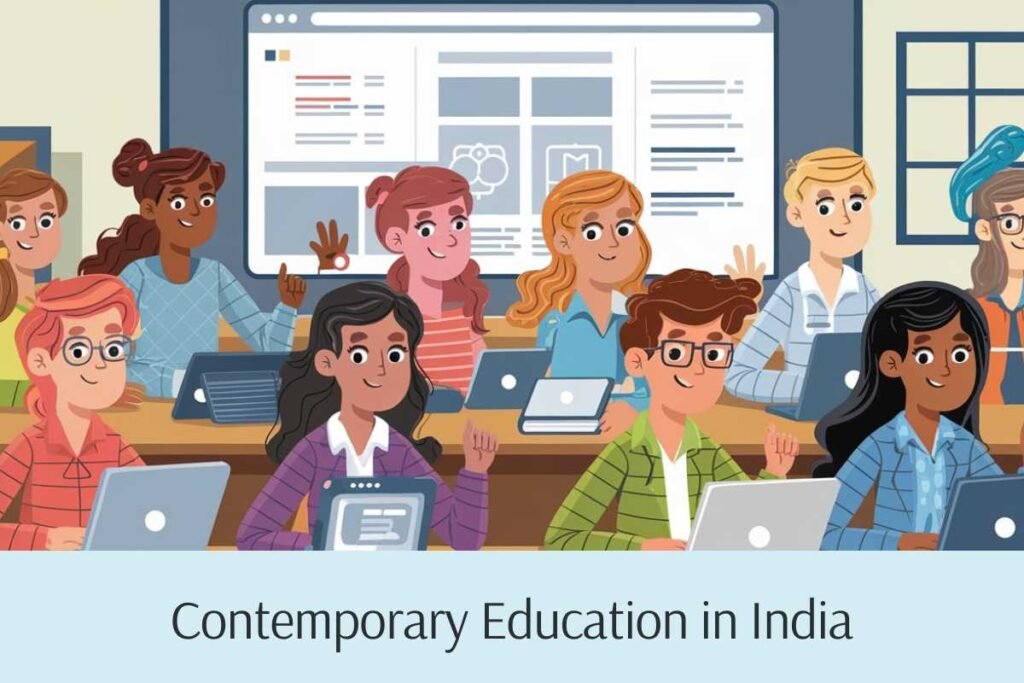Contemporary education in India is undergoing a significant transformation. With advancements in technology, evolving policies, and a more globalized approach, education in contemporary Indian society is rapidly adapting to meet the changing needs of students.
This article explores the key trends, challenges, and opportunities in India’s education system, focusing on how contemporary education is reshaping the landscape of learning in India.
fashion in Contemporary Education in India

As India continues to develop and modernize, its education system is also evolving to keep up with global demands. Let’s look at the major trends shaping education in contemporary India.
Digital Transformation in Education in Contemporary India
One of the most significant shifts in education in contemporary India is the integration of technology. The adoption of digital platforms, online classes, and e-learning resources has accelerated, particularly after the COVID-19 pandemic.
With the rise of EdTech startups, students now have access to a wide range of learning tools that cater to different needs, from video lectures to interactive quizzes. This digital revolution has made education more accessible and flexible than ever before.
Skill-Based Learning: The Future of Education in Contemporary India
Education in contemporary India is no longer about rote memorization. There’s a growing focus on skill-based learning, where students are encouraged to develop practical skills like critical thinking, problem-solving, and collaboration.
These skills are essential for succeeding in today’s fast-paced, technology-driven world. As a result, vocational training, STEM (Science, Technology, Engineering, and Mathematics) courses, and soft skills development are becoming increasingly popular across schools and universities.
Inclusive Education in Contemporary Indian Society
Contemporary education in India is placing greater emphasis on inclusivity. Efforts are being made to integrate marginalized groups, such as differently-abled students and those from economically weaker backgrounds, into mainstream education.
This shift towards inclusive education aims to provide equal opportunities for all and ensure that no student is left behind.
Globalization of Education: A New Era for Education in Contemporary India
Indian students and institutions are increasingly participating in global educational exchanges, collaborations, and partnerships.
Contemporary India’s education system is opening up to international trends, allowing students to benefit from exposure to global perspectives.
Universities are partnering with international institutions to offer exchange programs, joint degrees, and global internships. This globalization of education helps students gain a competitive edge in the global job market.
Challenges Facing Contemporary Education in India

Despite the advancements, several challenges persist in the Indian education system. These hurdles need to be addressed to ensure that contemporary education in India benefits all students equally.
Digital Divide and Accessibility Issues in Education in Contemporary India
While digital learning has grown, a significant portion of India’s population still lacks access to reliable internet and digital devices.
This digital divide is one of the key challenges that prevent many students, especially in rural areas, from benefiting from the opportunities offered by online education.
Bridging this gap is essential for ensuring that all students have equal access to quality education in contemporary India.
Quality Disparities Across Institutions
There is a wide variation in the quality of education provided by different institutions, particularly between urban and rural areas.
While top-tier institutions offer world-class education, many schools and colleges, especially in rural India, still struggle with outdated curriculum, lack of infrastructure, and insufficient teacher training. Ensuring that all students receive high-quality education in contemporary India remains a significant challenge.
Teacher Training and Professional Development
In the rapidly changing landscape of contemporary education in India, teachers must be equipped with the right skills and knowledge.
Continuous professional development is crucial for teachers to effectively use new technologies and teaching methods. Training teachers to meet the demands of modern education is an area that requires significant attention.
Curriculum Relevance in Contemporary Indian Education
As the job market evolves, the need for an updated curriculum that aligns with industry demands becomes more urgent. STEM education, artificial intelligence, and data science are gaining importance, but there is still a gap in incorporating these subjects into the mainstream curriculum.
Updating the curriculum to reflect the needs of the modern job market is essential to preparing students for future challenges.
Opportunities for Growth in Education in Contemporary India

Despite the challenges, contemporary education in India is full of opportunities for growth and improvement. These opportunities can transform India’s education system into a model for the future.
Growth of EdTech in Education in Contemporary India
The rise of EdTech companies is a game-changer for contemporary education in India. These startups are providing innovative learning tools, from personalized learning apps to online tutoring platforms.
The increasing use of artificial intelligence in education offers a unique opportunity for personalized learning, catering to the specific needs of each student. EdTech is making education more accessible and affordable for students across the country.
National Education Policy (NEP) 2020: A New Era for Education in Contemporary India
The National Education Policy (NEP) 2020 is one of the most significant reforms in contemporary Indian education. The NEP focuses on making education more holistic, inclusive, and multidisciplinary.
It aims to reduce the emphasis on rote memorization and promote critical thinking, creativity, and problem-solving. The NEP also focuses on improving the quality of education and making it more accessible for all students, regardless of their background.
Increased Investment in Education Infrastructure
Both the government and private sectors are investing heavily in education infrastructure, which will improve the quality of education in contemporary India.
These investments are leading to better facilities, modern teaching resources, and more opportunities for students. The growing focus on education as an essential tool for national development is driving these investments.
Research and Development
Contemporary education in India is also focusing more on research and innovation. Universities and institutions are placing greater emphasis on research as a critical component of higher education.
Encouraging students to engage in research activities not only enhances their learning but also contributes to the country’s overall development.
Conclusion
Contemporary education in India is evolving rapidly, and while challenges exist, there is immense potential for growth.
By leveraging technology, reforming policies, and ensuring inclusivity, India can create an education system that prepares students for a globalized world.
With continued investment in infrastructure and a focus on quality education, India can unlock the full potential of its educational sector and equip its students with the skills they need to succeed in the modern world.
FAQs
What are the key trends in contemporary education in India?
Key trends in contemporary education in India include digital transformation, skill-based learning, inclusive education, and the globalization of education.
How does the digital divide affect education in contemporary India?
The digital divide in India leads to unequal access to online learning resources, especially in rural areas, where students often lack access to reliable internet and digital devices.
What challenges does contemporary education in India face?
Challenges include digital accessibility, quality disparities between institutions, insufficient teacher training, and outdated curricula.
How is the National Education Policy (NEP) 2020 changing education in contemporary India?
The NEP 2020 aims to overhaul the education system by promoting holistic, multidisciplinary learning, reducing rote memorization, and improving the quality and accessibility of education.
What opportunities exist for contemporary education in India?
Opportunities include the growth of EdTech startups, increased investment in education infrastructure, and a stronger focus on research and development.







